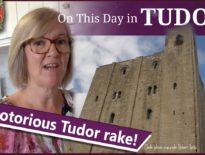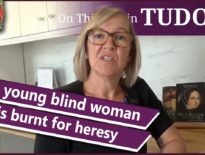On 2nd August 1595, as part of the Anglo-Spanish War of 1585-1604, four galleys containing somewhere between 200 and 400 Spanish soldiers landed at Mount's Bay on the coast of western Cornwall.
The local militia fled and so the Spaniards went on to cause devastation in the area.
Find out exactly what the Spaniards did in Cornwall in today's talk.
Also on this day in Tudor history, 2nd August 1581, an English Protestant named Richard Atkins was burned for heresy in Rome. What had led this Englishman to his end in Rome? What had he done? And why was he tortured on his way to his execution? Find out in last year’s video:
Also on this day in history:
- 1514 – Edward Stafford, Duke of Buckingham, was granted a licence to found a college at Thornbury.
- 1521 – Cardinal Wolsey arrived in Calais to act as peacemaker and preside over a conference aiming to put an end to the fighting between France and the Empire.
- 1553 – Elizabeth greeted her half-sister, the newly proclaimed Queen Mary I, in London.
- 1555 – Burning of James Abbes, Protestant martyr, in Bury for heresy.
- 1556 – Death of George Day, Bishop of Chichester. He was buried in Chichester Cathedral.
- 1589 – Death of Henry III of France after being stabbed in the abdomen by Jacques Clément, a fanatical Dominican friar, the day before. He was buried at the Basilica of Saint-Denis.
- 1596 – Burial of Thomas Whithorne, composer and autobiographer, at St Mary Abchurch, London. Whithorne was Chapel Master to Archbishop Matthew Parker.
- 1601 – Death of George Eyste, author, town lecturer, preacher and Vicar. He died in Bury St Edmunds, Suffolk, and was buried in his church, the Church of St Mary.
- 1605 – Death of Vice Admiral Sir Richard Leveson in the Strand, London. He was buried in St Peter's Church, Wolverhampton.
Transcript:
On 2nd August 1595, as part of the Anglo-Spanish War of 1585-1604, four galleys containing somewhere between 200 and 400 Spanish soldiers landed at Mount's Bay on the coast of western Cornwall. on what the Spaniards called 2nd August 1595, but which was 23rd July in England (England was still using the Julian Calendar but Spain was using the Gregorian Calendar). So really, I ought to be talking about this on 23rd July, oh well!
The Spanish fleet was commanded by Captain Carlos de Amésquita and it had left Port Louis, Brittany, France, on 26th July (16th July English) to raid the south-west of England.
The local English militia fled, allowing the Spanish troops to land, and to move on and burn Mousehole, Paul, Penzance and Newlyn, and also sink the ships in Penzance harbour. The Spanish forces raided local forts, stealing cannons and taking them back to their ships. It is said that before the Spaniards left on 4th August (25th July) they celebrated a Catholic mass and their captain promised to come back when Spain had invaded England and build a Catholic church on the site. The Spaniards then left, managing to avoid the fleet of Francis Drake and John Hawkins.
Paul Parish Church was mostly destroyed by the fire set by the Spanish forces, but then rebuilt in 1600. Pillars in the church still bear the marks of the fire.
Here are some primary source accounts of the Spanish raids on Cornwall:
23 July: "Hanibal Vyvyan to Sir Fras. Drake and Sir John Hawkins, generals of the fleet at Plymouth. I think you are informed of the Spaniards' landing this day in the western parts; they have burned Penzance, Newlyn, Mousehole, Poole Church, and Church Town, and other villages adjoining, without resistance; I speak it to the disgrace of those people. The only ships there are four galleys, but there are 40 sail seen to seaward. There is great want of leaders; the Spaniards' conquest without resistance may give them greater encouragement to land along the coast, as well to the east as north. I beg you, if your ships are not fit to fight, to send into these parts some of their leaders who have commanded in war, as they are greatly needed now, and will be more so if the Spaniards should land. If you lack mariners, I think 100 could be procured in 10 hours in Falmouth harbour. Noted by Sir Fras. Drake and Sir John Hawkins that this letter came to hand as the post was ready to take his horse, and that some captains are getting ready to go westward. Endorsed [by Cecil], " Hannibal Vyvyan, from the fort of Falmouth, to Sir Fras. Godolphin, advertising the burning of divers towns.""
23 July: "Sir Fras. Godolphin and Thos. Chiverton to Sir Fras. Drake and Sir John Hawkins, generals of the forces now at Plymouth. Four galleys are at anchor before Mousehole, their men landed, and the town and other houses in the country thereabouts are fired. No more of the fleet are in sight; 50 or 60 were seen Monday evening and yesterday, athwart of Falmouth. Pray consider what is to be done both for safety and defence.
P.S. About 200 men have assembled; we attend the coming of more, so as to make head towards the enemy."
Regarding the Spaniards celebrating mass:
"After they had burned Penzance and other villages, they had mass the next day on the Western Hill by a friar, where they vowed to build a friary when they had conquered England."
Of course, they never did conquer England, fortunately.



Leave a Reply